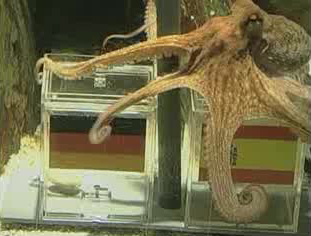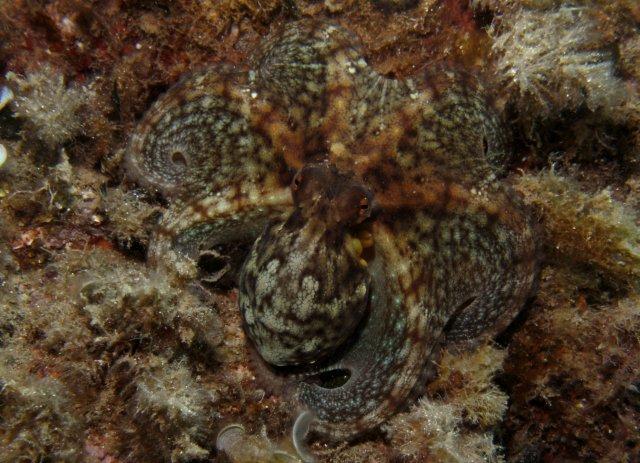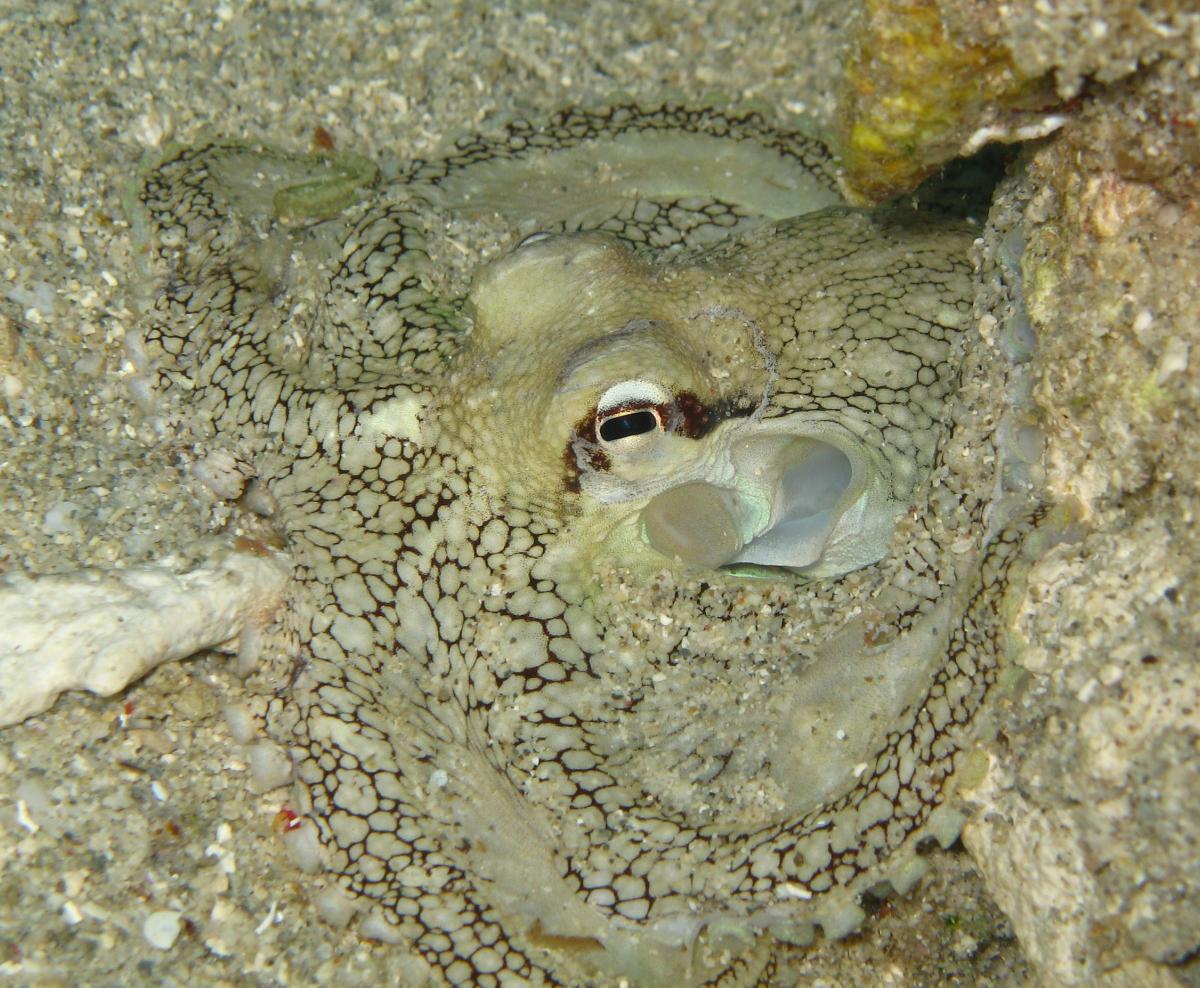As you no doubt know by now, I don’t shy away from offering up personal information for the sake of science, or at least blogging about science. I’m the kind of person who thinks that you delight in knowing that I fear dead invertebrates, adore axolotls, and scream, “He’s an ape, not a monkey!” while my daughters watch Curious George. So I’m going to assume that you will enjoy this tidbit about my younger daughter, who is two.
Said daughter adores the octopus. I think that her cephalo-fondness started when I bought her a book version of the Beatles song “Octopus’s Garden” (one of the few songs by the slothiest of the Fab Four) and began to play her the song regularly. For a long while, every time we got into the car, she’d yell, “AH-PAH-TAH SHADE!” until I played the song. (For those who don’t know, a recurring line in the song runs, “I’d like to be under the sea / In an octopus’s garden in the shade.”) All this has led to an impressive collection of ah-pah-tah stuffed animals, glass figurines, stickers, shirts, and other octopodal tchotchkes in our house.
My daughter is apparently a bit of a trendsetter, as octopuses are having something of a “moment” right now. They appear...well, trendy! My local children’s bookstore recently had a display of books all featuring octopuses, and stories about the lovely pink one,  for which the apt name Opisthoteuthis adorabilis is being contemplated, flooded the Internet earlier this summer. (Personally, my favorite octopus is still Paul, the World-Cup-prognosticator from 2010.) I offer all of this by way of introduction to a humorous event in the news this week.
for which the apt name Opisthoteuthis adorabilis is being contemplated, flooded the Internet earlier this summer. (Personally, my favorite octopus is still Paul, the World-Cup-prognosticator from 2010.) I offer all of this by way of introduction to a humorous event in the news this week.
A group of scientists recently finished sequencing the entire genome of the California two-spot octopus (Octopus bimaculoides). It’s the first cephalopod (that’s the group that includes octopuses, squid, and cuttlefish) to be given the whole-genome treatment, so there was some appropriate amount of hubbub. After all, cephalopods are crazy amazing and interesting—they have magician-like camouflage abilities and their intelligence has long been revered. Not to mention that they do viral-video-worthy tricks like unscrewing a jar from the inside and using coconut shells as protection. Does anyone want to still argue that humans are the only tool-users? Please.
Anyway. In the press release that accompanied the publication, co-senior author Clifton Ragsdale of the University of Chicago said,
The octopus appears to be utterly different from all other animals, even other molluscs, with its eight prehensile arms, its large brain and its clever problem-solving capabilities. The late British zoologist Martin Wells said the octopus is an alien. In this sense, then, our paper describes the first sequenced genome from an alien.
 As NCSE’s Glenn Branch put it, this is the sort of literary flourish that, while legitimate in itself, is perhaps not wise in today’s media environment. And sure enough, if you google “octopus alien,” you’ll get a lot of hits from not-so-reputable publications talking about octopuses as if they are, indeed, literally alien. Like, not-from-Earth alien.
As NCSE’s Glenn Branch put it, this is the sort of literary flourish that, while legitimate in itself, is perhaps not wise in today’s media environment. And sure enough, if you google “octopus alien,” you’ll get a lot of hits from not-so-reputable publications talking about octopuses as if they are, indeed, literally alien. Like, not-from-Earth alien.
I find it all rather amusing, and so does P. Z. Myers (friend to all cephalopods), who starts his blog on this by lamenting, “Jebus. The stupidity of the media is maddening.” Indeed! One publication, for what it’s worth, did seem to realize its mistake and offered a funny retraction: “Alas, some spoil-sport has done away with the theory [that octopuses are aliens] using something called ‘logic’.”
So it seems we’ll have to make peace with octopuses being merely figuratively out of this world.
 A couple of interesting postscripts. First, while “octopuses” is a perfectly acceptable plural form (while “octopi” is less so), the actual plural should be, if we were following Greek syntax, “octopodes” (oct-TAH-puh-tees), according to expert Richard Ross, who explained it on last week’s Science Friday. (If you follow that link, you’ll get a great video of an unusual predation method employed by the Larger Pacific Striped Octopus—there is no end to how awesome octopodes are!) But if you’re going to insist on “octopodes,” you may be perceived as pedantic—which is either a good or a bad thing, depending on your preference.
A couple of interesting postscripts. First, while “octopuses” is a perfectly acceptable plural form (while “octopi” is less so), the actual plural should be, if we were following Greek syntax, “octopodes” (oct-TAH-puh-tees), according to expert Richard Ross, who explained it on last week’s Science Friday. (If you follow that link, you’ll get a great video of an unusual predation method employed by the Larger Pacific Striped Octopus—there is no end to how awesome octopodes are!) But if you’re going to insist on “octopodes,” you may be perceived as pedantic—which is either a good or a bad thing, depending on your preference.
Second, the originator of the octopus-as-alien simile, the zoologist Martin Wells (1928–2009), was H. G. Wells’s grandson. And, you know, the Martian invaders in The War of the Worlds (1898) are described as octopus-like creatures: indeed, the narrator hears a soldier comment, “Octopuses…that’s what I calls ’em.” So Martin came by the comparison honestly!
Are you a teacher and want to tell us about an amazing free resource? Do you have an idea for a Misconception Monday or other type of post? See some good or bad examples of science communication lately? Drop me an email or shoot me a tweet @keeps3.

